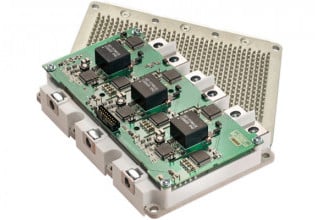Users of new High-Rel Ta Caps will Experience “First Failure in 10,000 Years”
KEMET Corp. announced two major technology breakthroughs that allow the company to deliver solid tantalum capacitors with the industry's best reliability and highest breakdown voltages. This technology is expected to meet the needs of engineers designing for medical, aerospace, defense and other high-reliability applications. It includes manufacturing processes for improved dielectric quality, mechanical robustness and a patented screening technique for simulating breakdown voltage. Combined with industry-leading reliability and breakdown voltage (BDV), these technologies also ensure that KEMET's high-grade tantalum capacitors for high reliability designs feature low and stable dc leakage currents.
“A strong, defect-free dielectric helps to improve performance and reliability in the field and supports stable, low DC leakage currents,†says Per Loof, KEMET’s CEO. “These latest developments for improving and verifying dielectric quality reinforce KEMET’s position as the world leader in tantalum capabilities and it allows us to offer customers more reliable tantalum options than any other manufacturer. Based on feedback from a third party, if you used 1,000,000 tantalum capacitors of this class, other solutions would have their first failure in approximately 6 months to one year, and our first failure would occur in 10,000 years.â€
Known as F-Tech, KEMET’s new tantalum manufacturing technology features techniques for optimizing chemical purity to eliminate hidden dielectric defects that could continue to grow in the field, leading to capacitor failure. The Company’s patented Simulated Breakdown Screening (SBDS) is a non-destructive testing technique that simulates capacitor BDV without damaging the capacitor. This screening is performed on 100% of product when required. Traditional dc leakage (DCL) tests cannot detect small defects in the dielectric and performing these tests at accelerated conditions can actually induce more defects.
Incorporating multiple process technologies, F-Tech is an improved approach to anode manufacturing based on a fundamental understanding of degradation mechanisms in tantalum capacitors. Some of the processes minimize an anode’s carbon and oxygen content as these elements can become contaminants that lead to crystallization of the anodic oxide dielectric. Another process technology enhances reliability by ensuring a stronger mechanical connection between the tantalum lead wire and the anode.
Breakdown voltage is the ultimate test of a capacitor dielectric, with a higher BDV indicating a stronger dielectric that will deliver higher reliability in the field. By evaluating the BDV of each and every capacitor, SBDS testing allows KEMET to provide customers with only the most reliable capacitors from a given lot.
After issuing the above statement: “our first failure would occur in 10,000 years†the company added the following note: “This does not constitute a warranty and is based on feedback from a third party with a mean failure rate of 0.0000036 PPMH as compared to typical performance of tantalum capacitors in this class of 0.34 PPMH to 0.67 PPMH.†These new technologies will allow KEMET customers to specify high-grade tantalum capacitors manufactured with the F-Tech process, utilize SBDS testing, or, for ultimate peace of mind, select both options.






